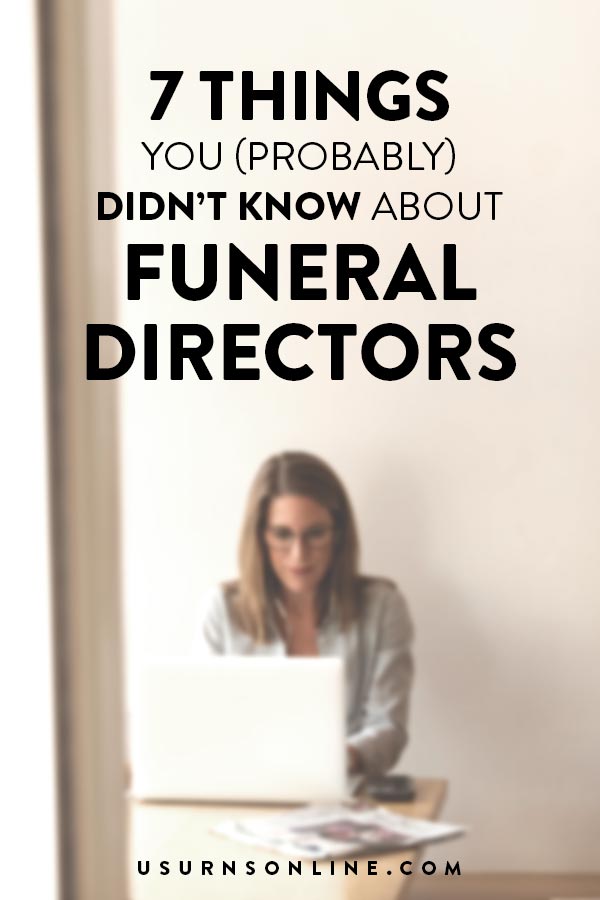In today’s society and throughout history, funeral directors have gotten a bad rap. Thanks to scary stories, movies, and breathless tabloid headlines, funeral directors are still thought of by many people as dark shadows of the night come to “undertake” your loved one into the mysterious lair that is the back of the funeral home (where they most certainly live, by the way).
More realistically, they are thought of as antisocial creeps, or shady salespeople at best.
But with the exception of a few (and they shall remain unnamed), most funeral directors are normal hard-working men and women, just like you and me, trying to make a small difference in this world while also making a living for their own families.
Here is a list of seven things you didn’t know about funeral directors and the necessary work they do.
7 Things You Didn’t Know About Funeral Directors
1. Funeral directors do not make a lot of money
The modern funeral director is often thought of as the old guy in the tattered gray suit with the clipboard and fountain pen just inkling to sell you the highest-priced casket or urn.
Quick tip: You can still find great deals and a wide selection of cremation urns online. Take a look here.
While there are unfortunately crooked people in every industry, including funeral service, chances are your funeral director is not going to try to swindle you. Yes, your emotions are on high as you grieve your loved one, but a director with any shred of decency is not going to try to take advantage of that…they are not after your money in that sense.
The truth is that funeral directors are generally not wealthy people, nor do they strive to be. With the exception of some who may own a family business, their average annual salary hovers around $50,000, which is not a lot at all considering all the time and energy it takes to do the job.
2. Funeral directors are not all embalmers
Funeral director does not automatically mean embalmer, too. In many states, funeral directors and embalmers are trained and licensed separately, although many are dual-licensed.
Some funeral directors got into the industry with the sole goal of doing one job or the other. Even among those who are both funeral directors and embalmers, there is usually one job that they are more skilled at or more interested in, and that’s the job they stick to. It’s as simple as that.
3. Funeral directors are not dulled to emotion
It’s a common misconception. You might think that, because they are around death and grief 24/7, surely funeral directors must be numb to the sadness and therefore are out of tune with the emotions of the family they are currently taking care of.
But this cannot be further from the truth. Most funeral directors got into the business because of their empathetic natures (this is especially true of women, who make up just under a fourth of all funeral directors in the United States–a trend that continues to grow).
While it’s true that there are many who grew up in the funeral home and inherited the company from a parent or grandparent, many came to the funeral industry out of the goodness of their hearts.
4. Funeral directors go through rigorous training
Many states require funeral directors to go through mortuary school, pass a licensing exam and complete an apprenticeship. Mortuary schools are notoriously difficult and a majority of those who enroll will not graduate.
In addition, government agencies that are tasked with overseeing funeral business can implement steep punishments or disciplines upon practitioners who step out of line.
Keep this in mind the next time you have to speak with a funeral director…they did not come into their position easily and they take their work very seriously. Like those in many other important professions, they worked too hard to get to where they are to risk bad behavior!
5. Funeral directors have been where you are
Funeral directors are people too. They too know what it feels like to lose a loved one and to have to plan out a service while in the midst of grief.
In fact, many if not most got into the funeral business because of the loss of their own loved one. They remember the experience they had dealing with a funeral director (whether it was good or bad).
Remember this as you attend that initial arrangement conference and meet your director for the first time. It may bring you a little bit of comfort to realize that, yes, they’ve been there.
Quick tip: Did you know that most funeral homes do not provide a eulogy writing service, or even a template? While obituary outlines are often provided, eulogy writing services are not, at least not through the funeral home. If you are in need of a quality eulogy writing service, we may be able to help. Please see here for more information.
6. Funeral directors don’t want you to know…yeah
Type in a search for “facts about funeral directors” and you will find site upon site listing something along the lines of “What funeral directors don’t want you to know….”
These sites irk those who are actually in the business, those who try every day to do the best they can. Not just for the families who are in their care, but for the funeral industry as a whole, which still suffers unfair scrutiny and bad publicity from time to time.
If you have had a negative experience with a funeral director in the past, it’s only natural to assume that your next experience (let’s hope that’s a long, long time away) will also be unpleasant. But unless you are dealing with the same funeral home, chances are that will not be the case.
Most funeral directors are extremely caring people, and if you let them know your concerns, they will work extra diligently to ensure that this experience will be a much smoother one for you.
Sidebar: Still, it’s good to be informed and prepared. So we suggest reading our take on this topic, 10 Things The Funeral Home Won’t Tell You.
7. Funeral directors are human, too
Funeral directors are not machines and they do make mistakes. But if you have a good one, their mistakes will be few and far between, and you will be immediately notified if something needs to be discussed.
Do you know a funeral director? They would probably love one of these 21 Classy Gift Ideas for Funeral Directors, or perhaps they would be more into these 21 Macabre Mortician Gifts.
Show your appreciation for a funeral director today!
An experienced director has been through almost every possible scenario that can occur during a service, several times over, and is very knowledgeable on how to navigate any bumps along the way. And if they can’t fix something for you themselves, they know who to call to get the issue taken care of!
It is our hope that you found this article informative (or at least a little entertaining!). In all seriousness, if you have experienced the loss of a loved one, the most important thing to know about your funeral director is that they are there for you. It is quite literally their job to be just a phone call away should you have any questions at all about the funeral process for your loved one.
Pin It


Aubrey is a lifelong writer who has served in the funeral industry since 2016. After graduating from Dallas Institute of Funeral Service, she knew she wanted to continue to serve families through her writing, but didn’t know how.
Soon after, Aubrey experienced a “lightbulb” moment and started her eulogy writing business, Eulogies by Aubrey, in 2019.
Aubrey has written professionally since 2012, covering not only funeral-related topics and gift trends, but also for TV guide listings, as well as legal topics. She began writing for US Urns Online in 2019.
Aubrey’s work has been featured in Huffpost, Coming of Age Magazine, and 1800Flowers.com. She holds certifications in Cremation Arrangement (ICCFA) and Burial at Sea (NEBAS), and as of 2023, is a trained and certified birth and bereavement doula (SBD). Aubrey is currently studying toward her degree in Business Administration.
